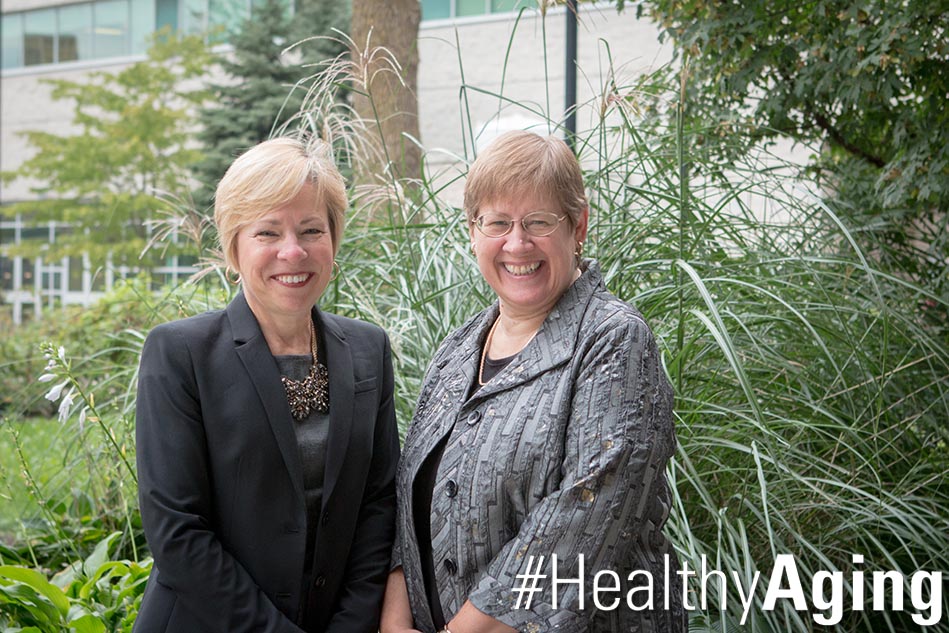New program takes care for seniors out of the clinic and into the community

Markle-Reid (left), Canada Research Chair in Aging, Chronic Disease and Health Promotion Interventions and Jenny Ploeg, a professor in McMaster’s School of Nursing have developed a new way to deliver care to seniors with diabetes and multiple chronic conditions that addresses all patients’ needs– medical, social and psychological–in a holistic way.
BY Erica Balch
September 30, 2016
It’s a public health problem of global proportions. More than 370 million people worldwide are living with diabetes– the vast majority with Type 2 diabetes– and of those, most are seniors.
But they aren’t just managing diabetes. Three quarters of these seniors are also living with other chronic diseases.
Their care is complex. They see multiple specialists for their conditions and often experience serious complications, leading to increased trips to the emergency room.
Now, a new study has found that a program developed by researchers in McMaster’s Aging, Community and Health Research Unit could transform the way diabetes care is delivered to seniors, resulting in better health outcomes for patients, at no additional cost to the system.
According to Drs. Maureen Markle-Reid and Jenny Ploeg who developed the model, it’s a question of bringing diabetes care for these seniors out of the clinical setting and into the community.
“75% of the factors that influence health lie outside the health care system,” says Markle-Reid, Canada Research Chair in Aging, Chronic Disease and Health Promotion Interventions. “Our idea was to deliver care to people in a place that is very senior-friendly and where we can focus on all the determinants of health, not just on providing medical treatment. We wanted to ensure that we were addressing all of their needs– medical, social and psychological– and addressing them in a holistic way.”
The program, which began as a pilot project funded by the Labarge Optimal Aging Initiative, brings registered nurses and registered dietitians, who are certified diabetes educators, from local diabetes clinics into a community centre– either a senior’s centre or the YMCA– where they work as a team with community centre staff and volunteers to deliver a health promotion program, or ‘intervention,’ for seniors with diabetes and multiple chronic conditions.
The program, includes monthly wellness sessions run by Certified Diabetes Educators, as well as program coordinators and volunteers from the community centre. Together, they provide seniors with diabetes education, physical activity and peer support.
Seniors also receive a series of home visits with a registered nurse and a registered dietitian and, if needed, are provided with transportation to and from the wellness sessions.
Each member of the team delivering the program receives training geared toward both their role in the intervention and their level of diabetes knowledge. They, in turn, train other care providers. Team members also meet monthly to plan wellness sessions and to determine whether any patients are at risk, or in need of extra support.
“The program was seen as very valuable by the participants,” says Ploeg, a professor in McMaster’s School of Nursing, who adds that the response from seniors throughout the six-month study was overwhelmingly positive. “They received care in a much more supportive environment where there are social supports, education and exercise. They could share a meal together and learn from each other. People really enjoyed that.”
Not only did seniors prefer this model, the study revealed it was also more effective.
According to Markle-Reid and Ploeg the seniors in the program had greater improvements in health-related quality of life than those receiving what is known as, “usual care,” with no increased cost to the system.
“There’s always the assumption that when you add more services, it’s going to cost more,” says Markle-Reid. “But what we have shown is that if services are provided in a proactive and comprehensive way, with a focus on prevention, and providers have the knowledge and support to manage the complex care needs of this population, it either won’t cost more, or you’ll see a reduction in cost.”
Markle-Reid and Ploeg are currently testing the program in partnership with co-investigators, primary care networks and community groups in Alberta. Once the results of that study are in, they plan to test the model more widely, and say that ultimately, it could be scaled to a provincial, national and even international level.
In the meantime, the program, which ran in Guelph, Kawartha Lakes, London, Peterborough and Port Hope, has left a lasting impact.
In Port Hope, diabetes practitioners are continuing to work the YMCA to provide diabetes care for seniors, a testament both to the power of these community partnerships and to the sustainability of the program.
“After we finished our study, they kept holding clinics,” says Markle-Reid. “They’re still going into the senior’s centre, they’re providing education and support. We’ve forged partnerships that didn’t exist before and this can only strengthen the system because it puts us in a positioning where we can address all the determinants of health.”


